
JOURNAL OF INTERVENTIONAL CARDIAC ELECTROPHYSIOLOGY
Scope & Guideline
Empowering Healthcare Professionals with Electrophysiology Insights
Introduction
Aims and Scopes
- Atrial Fibrillation Management:
Significant emphasis on catheter ablation techniques for atrial fibrillation (AF), including various energy sources like cryoablation and radiofrequency ablation, as well as innovative technologies such as pulsed-field ablation. - Ventricular Arrhythmias:
Research includes studies on the mechanisms, treatment, and outcomes of ventricular arrhythmias, with a focus on catheter ablation strategies and device interventions. - Electrophysiological Mapping and Imaging:
Utilization of advanced mapping technologies, including high-density mapping and 3D electroanatomical mapping, to enhance procedural outcomes and understand arrhythmia substrates. - Innovative Techniques and Technologies:
Exploration of new technologies such as leadless pacemakers, subcutaneous implantable cardioverter-defibrillators (ICDs), and novel ablation devices, aimed at improving patient safety and procedural efficacy. - Patient Outcomes and Quality of Life:
Studies assessing the impact of electrophysiological interventions on patient-reported outcomes, quality of life, and long-term health metrics post-procedure. - Multidisciplinary Approaches:
Research that highlights the importance of collaboration across specialties to improve outcomes in complex cases, including studies on the integration of anesthesia, imaging technologies, and surgical techniques.
Trending and Emerging
- Pulsed-Field Ablation Techniques:
This emerging technology is gaining traction as a potential alternative to traditional ablation methods, with studies focusing on its safety, efficacy, and mechanisms of action. - Zero Fluoroscopy Techniques:
A growing emphasis on techniques that minimize or eliminate fluoroscopy during electrophysiological procedures, promoting patient safety and reducing radiation exposure. - Patient-Centric Research:
An increasing number of studies explore the impact of electrophysiological interventions on patient quality of life, emphasizing the importance of patient-reported outcomes in evaluating treatment success. - Artificial Intelligence and Machine Learning Applications:
The application of AI and machine learning in cardiac electrophysiology is emerging, with studies aimed at improving diagnostic accuracy and procedural efficiency through advanced data analysis. - Comprehensive Care Models:
Research is trending towards multidisciplinary approaches that integrate various specialties in managing complex arrhythmias, reflecting a holistic view of patient care. - Use of Advanced Imaging Techniques:
An increased focus on the integration of advanced imaging modalities, such as intracardiac echocardiography and cardiac MRI, to enhance procedural guidance and outcomes.
Declining or Waning
- Traditional Pharmacotherapy for Arrhythmias:
There appears to be a waning focus on conventional antiarrhythmic drug therapies, as newer interventional techniques gain prominence, particularly in the management of atrial fibrillation and ventricular arrhythmias. - Invasive Diagnostic Procedures:
The reliance on invasive diagnostic techniques such as electrophysiological studies has decreased as non-invasive imaging and mapping technologies become more sophisticated and widely adopted. - Fixed-Protocol Ablation Techniques:
A decline in research focusing on rigid, one-size-fits-all ablation protocols, as personalized and precise approaches tailored to individual patient anatomy and arrhythmia mechanisms gain traction. - Long-Term Follow-Up Studies:
Fewer publications emphasize long-term follow-up studies on established techniques, possibly due to the increasing interest in immediate procedural success and patient-centered outcomes.
Similar Journals

Journal of Vascular Surgery-Venous and Lymphatic Disorders
Elevating surgical excellence in venous and lymphatic care.The Journal of Vascular Surgery-Venous and Lymphatic Disorders, published by Elsevier, is a distinguished peer-reviewed journal dedicated to advancing the knowledge and practice of vascular surgery with a particular focus on venous and lymphatic conditions. With an ISSN of 2213-333X and a robust impact factor, this journal ranks Q2 in Cardiology and Cardiovascular Medicine and Q1 in Surgery, reflecting its high relevance and contribution to the field. Covering a wide spectrum of topics from innovative surgical techniques to the latest developments in venous and lymphatic disorders, the journal serves as a vital resource for researchers, clinicians, and students alike. It not only disseminates cutting-edge research but also promotes best practices and interdisciplinary collaboration within the cardiovascular domain. The journal is accessible to a global audience, ensuring that impactful findings reach practitioners and researchers everywhere, further elevating the standards of patient care and surgical excellence.
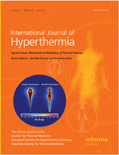
INTERNATIONAL JOURNAL OF HYPERTHERMIA
Elevating cancer treatment with groundbreaking hyperthermia studies.INTERNATIONAL JOURNAL OF HYPERTHERMIA, published by Taylor & Francis Ltd, is a leading peer-reviewed journal dedicated to advancing the field of hyperthermia and its applications in medical science, particularly within cancer research and related disciplines. With an ISSN of 0265-6736 and an E-ISSN of 1464-5157, this journal has been a vital resource since its establishment in 1985, offering a platform for innovative research and clinical applications aimed at improving treatment outcomes. The journal is recognized with a Q2 category ranking in several fields, including Cancer Research and Physiological Medicine, reflecting its significant contribution to scientific knowledge and clinical practices. Furthermore, it has been Open Access since 2019, ensuring that cutting-edge research is accessible to a global audience. By facilitating the exchange of ideas and fostering collaborations among researchers, professionals, and students, the INTERNATIONAL JOURNAL OF HYPERTHERMIA serves as an essential resource in the quest to exploit hyperthermia’s full potential in therapeutic settings.
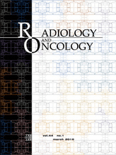
Radiology and Oncology
Empowering the medical community with open access to vital discoveries.Radiology and Oncology is a prominent open access journal that has been instrumental in advancing the fields of radiology and oncology since its inception in 1992. Published by SCIENDO in Germany, this journal aims to disseminate high-quality research articles, reviews, and case studies that address critical issues in diagnostic imaging and cancer treatment. As of 2023, it holds a commendable impact factor within the Q2 category for Radiology, Nuclear Medicine, and Imaging, and a Q3 standing in the field of Oncology—reflecting its importance in these critical areas of medicine. With a focus on promoting innovative research and interdisciplinary collaboration, Radiology and Oncology is indexed in Scopus, where it ranks #122 among 333 in its category and #187 among 404 in Oncology, showcasing its wide-reaching impact and relevance. The journal is fully open access since 2007, ensuring that vital research is accessible to the global medical community and fostering advancements in patient care strategies and therapeutic methodologies. By providing a platform for the latest developments and discoveries, Radiology and Oncology is a pivotal resource for researchers, clinicians, and students dedicated to improving outcomes in cancer care through innovative imaging techniques.

Heart Rhythm O2
Advancing cardiac care through open access research.Heart Rhythm O2, published by Elsevier and indexed under ISSN 2666-5018, is a premier Open Access journal that has established itself as a vital platform for the dissemination of innovative research in Cardiology and Cardiovascular Medicine. Since its inception in 2020, this journal has rapidly gained recognition, achieving a distinguished Q1 ranking in its field as of 2023, underscoring its commitment to excellence and quality. Operating from its base in the Netherlands, Heart Rhythm O2 aims to bridge the gap between clinical practice and emerging scientific findings, fostering collaboration among researchers, healthcare professionals, and students globally. With a focus on high-impact original research, review articles, and clinical studies, the journal is dedicated to advancing our understanding of cardiac rhythm management and cardiovascular health. With open access options, it ensures that vital knowledge is freely available, facilitating the ongoing education and engagement of the medical community worldwide.
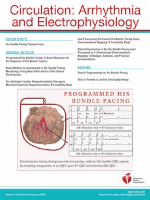
Circulation-Arrhythmia and Electrophysiology
Exploring the frontiers of electrophysiology and cardiac care.Circulation-Arrhythmia and Electrophysiology, published by Lippincott Williams & Wilkins, is a premier journal dedicated to advancing the field of cardiology and electrophysiology. With a strong emphasis on clinical and experimental research, this journal serves as a critical platform for disseminating innovative findings concerning arrhythmias and cardiac electrical activity. Operating in a highly competitive academic environment, it boasts an impressive Q1 ranking in key categories such as Cardiology and Cardiovascular Medicine, as well as Physiology (medical), positioning it within the top tier of publications in these fields. Spanning a comprehensive converged period from 2008 to 2024, Circulation-Arrhythmia and Electrophysiology offers researchers and clinicians access to cutting-edge studies that inform best practices and influence treatment protocols. Although it does not provide open access options, it remains invaluable for professionals seeking to enhance their understanding of complex electrophysiological phenomena and contribute to the evolution of cardiovascular care.
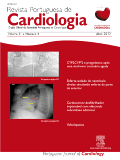
Revista Portuguesa de Cardiologia
Advancing cardiovascular knowledge for a healthier tomorrow.Revista Portuguesa de Cardiologia, published by Elsevier España SLU, stands as a pivotal resource in the realm of Cardiology and Cardiovascular Medicine. With its origins tracing back to 1970, this journal has cultivated a robust academic presence, achieving a 2023 Q3 ranking in its category, and currently holding a position of #220 out of 387 on the Scopus rankings, placing it within the 43rd percentile of its field. This open access journal, available since 2011, aims to disseminate high-quality research and insights relevant to contemporary cardiovascular issues. Its commitment to accessibility and knowledge exchange enhances its importance for clinicians, researchers, and students alike, fostering a more informed community in the fight against cardiovascular diseases. Operating from its base in Barcelona, Spain, the journal welcomes contributions that further the understanding and treatment of heart conditions, contributing significantly to the advancement of cardiovascular health.
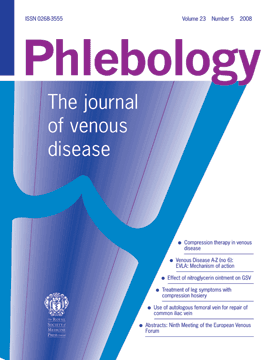
PHLEBOLOGY
Elevating clinical insights in the realm of phlebology.PHLEBOLOGY is a renowned academic journal published by SAGE Publications Inc. that focuses on the evolving field of phlebology and related cardiovascular issues. With an ISSN of 0268-3555 and an E-ISSN of 1758-1125, this journal serves as a pivotal platform for disseminating high-quality research, clinical findings, and innovative practices in venous disease management and treatment. Operating from the United Kingdom, tasked with a mission to advance the scientific understanding and clinical practice surrounding venous disorders, PHLEBOLOGY is currently ranked in the Q3 category for both Cardiology and Cardiovascular Medicine, as well as in Medicine (miscellaneous) for 2023. Its Scopus rank of #192 out of 387 highlights its commitment to excellence, ensuring that it reaches a respectable 50th percentile within its fields. Although it does not offer open access, the journal invites contributions from researchers, healthcare professionals, and students, fostering a community dedicated to improving patient outcomes and promoting evidence-based practices in venous health.

JOURNAL OF CARDIOVASCULAR ELECTROPHYSIOLOGY
Pioneering Research in Cardiac ElectrophysiologyJOURNAL OF CARDIOVASCULAR ELECTROPHYSIOLOGY, published by Wiley, stands at the forefront of the fields of Cardiology and Cardiovascular Medicine, boasting an impressive Impact Factor that reflects its scholarly influence. With a strong focus on innovative research, this esteemed journal has been a vital resource for advancing our understanding of electrophysiological concepts since its inception in 1990. As a Q1 journal in both Cardiology and Physiology (medical) as of 2023, it provides a platform for cutting-edge discoveries and comprehensive reviews that cater to the academic and clinical needs of researchers, practitioners, and students alike. The journal features rigorous peer-reviewed articles that delve into various aspects of cardiovascular health, enhancing both theoretical knowledge and clinical application. Although it does not offer open access, it remains a key resource for those engaged in cardiovascular research, published quarterly through 2024 to ensure timely dissemination of high-quality findings.
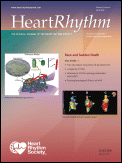
HEART RHYTHM
Exploring the heartbeat of medical breakthroughs.HEART RHYTHM is a leading academic journal published by Elsevier Science Inc, focusing on cutting-edge research in the field of cardiology and cardiovascular medicine. Established in 2004 and continuing its impactful journey through 2024, this journal holds an esteemed position within the academic community, boasting a 2023 Q1 ranking in both Cardiology and Cardiovascular Medicine and Medical Physiology, indicating its significant influence and contribution to these areas of study. With a commendable Scopus ranking—ranked #34 out of 387 in Cardiology and #11 out of 113 in Physiology—HEART RHYTHM is recognized for publishing high-quality research that drives advancements in understanding heart rhythms and associated medical conditions. Although it does not support open access, the journal remains accessible to professionals, researchers, and students, serving as a vital resource for the latest findings and theories in cardiovascular health. Invested in the mission to enhance knowledge and improve clinical practices, HEART RHYTHM stands as an essential publication for those aspiring to excel in the fields of cardiology and cardiovascular research.

Agri-The Journal of the Turkish Society of Algology
Fostering Collaboration in the Pursuit of Pain ReliefAgri - The Journal of the Turkish Society of Algology, published by KARE PUBL, is a significant academic platform dedicated to advancing the field of anesthesiology and pain medicine. Established in 1993, this journal has made substantial contributions towards understanding pain management strategies and therapeutic interventions in the medical community in Turkey and beyond. With an impact factor reflecting its Q3 category ranking within Anesthesiology and Pain Medicine and a respectable Scopus rank of 93 out of 136, it provides critical insights and research findings that are instrumental for both clinicians and researchers alike. The journal operates under an open access model, which enhances the visibility and accessibility of valuable research outputs for a global audience. An essential resource for professionals in pain management, Agri encourages the exchange of innovative ideas and groundbreaking studies within this vital area of medicine.